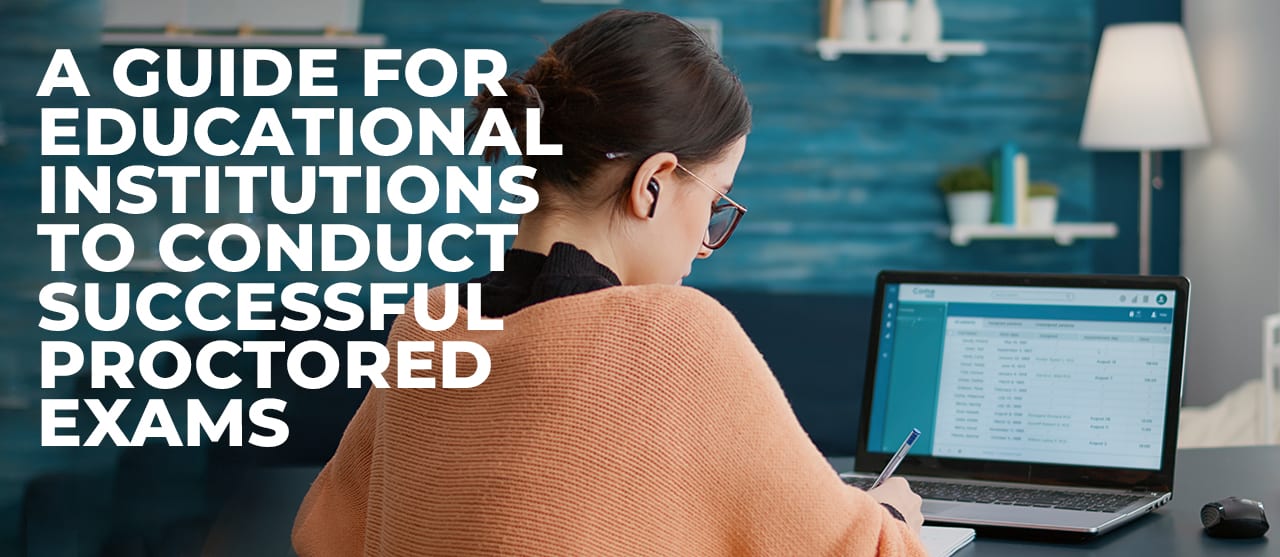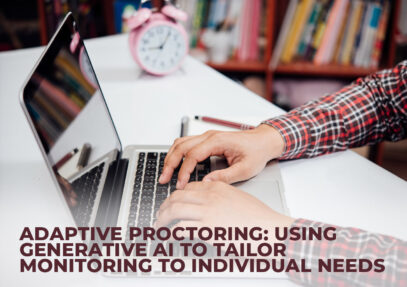
Before the pandemic, online proctored exams were considered an innovation and luxury. Today, proctoring has become the need of the hour. This has led to a sudden surge in demand for online proctoring tools to protect the integrity of exams. The EDUCAUSE COVID-19 QuickPoll revealed that 54% of academic institutions were using remote or online proctoring services, whereas 23% were considering and planning to use them.
But it must be noted that proctored exams are not full-proof. There may be risks of identity or data theft and other privacy concerns that may affect students. To ensure proctored exams run smoothly, educational institutions should take the necessary steps to facilitate seamless student experiences and enhanced outcomes.
Understanding Remote Proctoring
According to a market study, the worldwide eLearning market is estimated to reach $319.167 billion by 2025. The paradigm shift to online learning has prompted colleges and universities to adopt alternative modes of exams – precisely where the idea of remote proctoring comes to the fore.
Remote proctoring involves taking online assessments using an advanced mechanism to ensure the authenticity of students and prevent them from cheating. This is achieved with a real-time proctor present during the assessment via video conference or webcam surveillance or using AI-enabled online proctoring software. The latter takes the student’s pictures randomly for assessment.
One of the primary benefits of online proctored exams is that students can be monitored during the exam without a real proctor present physically throughout the test. In addition, online proctored tests also take away the burden of logistical nuances of conducting physical exams in centers.
Besides, proctored exams save time and effort. They cut down the overall time required for a traditional exam procedure. From paper distribution to answer sheet collection, students and institutions need not go through the lengthy process.
Online Proctored Exams Are The Future
There are multiple challenges involved in moving some of the high-stake exams to online mode. However, remote proctoring ensures that the authenticity and integrity of the assessment remain unquestionable.
With advanced new-age remote proctoring, institutions have access to a technology-driven alternative to physical invigilation that works perfectly in the virtual scenario. Here’s how proctored exams are leading the way:
- Objective Assessments: Students score higher and take less time to perform online tests with proctored software. Furthermore, remote proctoring also ensures that students do not open multiple browser windows. It also verifies the authenticity of candidates – thus, guaranteeing a transparent process.
- Flexibility: Proctored exams provide the facility to allow students to choose their preferred time slots. This avoids inconvenience and facilitates test-givers to write the exam when they’re most comfortable.
- Real-Time Reports: Proctoring software gives real-time performance reports during the exam. This leads to an effective and transparent process, which is a win-win situation for the candidate and the exam conducting body.
- No Location Restriction: Proctoring software eliminates location constraints to empower students to take examinations from anywhere.
- Data Security: While data security is a pressing issue for online proctored exams, the most reliable solutions sustain the integrity of data. They deploy advanced data encryption tools with safe browsing techniques to make sure unauthorized people cannot access the vital intellectual property.
How To Make Proctored Exams Run Smoothly?
1. Clearly Defined Exam Rules
Since online exams are not new to students anymore, they come prepared. However, proctoring is still evolving as a concept. Therefore, institutions must lay out the rules of the exams and reassure students that they’re safe. Even the most trivial issues should be clearly defined, and actionable measures should be cited for a smooth exam.
2. Practice Sessions
Practice sessions enable students to test the hardware before the exam. Institutions must create multiple sessions for practice so that examinees running into problems can retry and find a solution to the issue. It is very important to ensure that the issue is acknowledged by both parties, confirmed, and fixed. When students go through it in advance, they have time to get back to the support team to get the hardware/software issues fixed.
3. Listen To Students’ Concerns & Experiences
It is imperative to listen to students and their concerns about proctored exams. Considering that the technology is relatively new, it’s even more important to make a genuine effort to listen to students’ experiences and address their queries. There must be proctored exam guidelines clearly defined in place, and students must be informed about the same. If anything goes wrong, it is vital to treat the issue seriously and address it promptly to keep the exam-taking experience positive for all.
4. Have A Backup
Online proctored exams must have a backup plan to make sure the exam procedure runs smoothly. For example, students often end up making mistakes. They may accidentally click on the “Finish” or “Submit” button. An example of improving the interface to avoid this particular situation would be having a “Review” button instead of direct submission. All in all, it is essential to have a backup plan for such cases.
5. Continuous Support For Students
Online proctored exams ensure continuous support is available for students. In case of any technical difficulties, the support team comes in handy and quickly assists students. They ensure that any reported issue goes through correct troubleshooting, making the test experience smooth and comfortable for students.
6. Provide A Forum To Gather Student Feedback
Provide a forum to students where they can give their input about the proctored exam. Gathering valuable feedback from students about their first-hand experience of online proctored exams is an excellent way to improve. Students’ first-hand experience can bring to light the technical issues, procedure-related insufficiencies, and other flaws that can be worked upon. After all, the institution’s primary motive is to deliver the most effective assessment possible.
7. Leverage The Online Proctoring Services By EnFuse
With remote education becoming mainstream, institutions should make use of proctoring services to supervise online tests and assessments. EnFuse offers secure and reliable proctoring services globally with a distinctive, customizable platform to meet unique assessment requirements.
Using highly configurable technology and tools makes remote assessments easier and more convenient for administrators and students. The AI-powered proctoring software allows seamless integration with browser-based applications like LMS, thus giving institutions the flexibility to administer online exams securely – anywhere and anytime. Get in touch to learn more.

















Comment